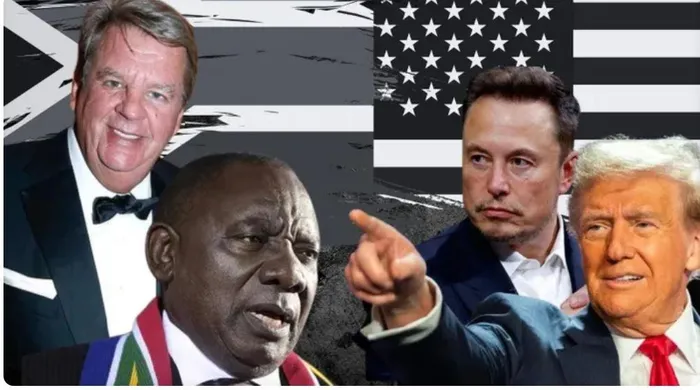South Africa's government seeks to ease Black ownership laws for Starlink's entry

President Cyril Ramaphosa's delegation meets with his US counterpart Donald Trump on Wednesday.
Image: IOL
THE South African government appears to be bending over backwards to improve relations with the United States, including potential changes to Black ownership requirements that could allow Elon Musk’s Starlink internet service to operate in the country.
This comes amid media reports that President Cyril Ramaphosa’s high-powered delegation was offering a workaround to South Africa’s Black Economic Empowerment (BEE) laws to enable Starlink’s entry into the local market.
Ramaphosa was expected to meet with US President Donald Trump on Wednesday.
Starlink, a satellite-based internet service developed by Musk’s SpaceX, was aimed at providing global internet access, especially in underserved or remote regions.
Musk, who was born in South Africa, has previously claimed that Starlink was prohibited from the country because he is not Black.
The South African government swiftly rejected this claim, stating that the laws applied equally to all foreign-owned telecommunications companies.
The government’s reported offer involves allowing Starlink to meet the requirements of South Africa’s equity rules through alternative investments, such as infrastructure or small business development.
These kinds of arrangements, known as "equity equivalent" programmes, have been accepted in other industries where direct equity ownership isn't feasible due to global company structures.
A meeting was reportedly scheduled for Tuesday evening between South African officials and representatives from Starlink or possibly Musk to seal the offer.
The discussions took place as Ramaphosa led a delegation to Washington in an effort to mend the fractured diplomatic ties with the US.
Tensions between the two countries have been mounting in recent months, particularly following Trump’s controversial remarks alleging the existence of “white genocide” in South Africa, a claim not backed by credible evidence and strongly denied by the South African government.
Ramaphosa was expected to meet Trump on Wednesday to discuss trade, investment, and security cooperation. The South African delegation’s trip has been seen as a major diplomatic effort to rebuild relations between the two nations.
Minister of Communications and Digital Technologies Solly Malatsi previously indicated that the government was considering new policy directives that would allow for equity equivalent investment options in the ICT sector.
In an October statement, he said these alternatives would “provide the certainty necessary to attract increased investment in ICT and accelerate universal internet access.”
The proposed changes were likely to benefit companies like Starlink, which operated globally and may be restricted from selling local equity stakes due to company structure or international regulations.
The US government, meanwhile, has recently launched a new commercial diplomacy strategy through its Bureau of African Affairs.
The strategy, introduced in Cote d’Ivoire last week, aims to place trade, private-sector investment, and concrete partnerships at the heart of US policy in Africa.
Speaking at a press briefing in Washington on Monday, Ambassador Troy Fitrell, a senior official in the Africa Bureau, said the new approach would guide future investment and partnership decisions between the US and African countries.
When asked about Musk’s claims and whether the US supported allegations of genocide in South Africa, organisers deflected, saying the briefing was solely about the new strategy.
The potential Starlink deal has already sparked political backlash within South Africa. The Economic Freedom Fighters (EFF), a prominent opposition party, has vowed to challenge the move both in court and through public protest.
In a statement, the EFF criticised Ramaphosa’s visit, accusing him of attempting to “appease the Trump administration and white capital” by potentially weakening transformative laws like the National Health Insurance Act, the Basic Education Laws Amendment Act, and the Expropriation Act.
As the meeting between Ramaphosa and Trump draws near, observers say the outcome could signal the future direction of South Africa’s foreign investment policies, especially regarding how the government balances economic development with its own equity and transformation goals.
Johann Rupert, South Africa's businessman, is also said to be part of Ramaphosa’s delegation. According to media reports, Rupert was claimed to have a hand in securing the meeting between Ramaphosa and Trump.
Neither the Department of Communications nor the Presidency has provided official comment on the Starlink reports.
Ramaphosa's delegation includes International Relations and Cooperation Minister Ronald Ramola, Trade and Industry Minister Parks Tau, Agriculture Minister John Steenhuisen, and Minister in the Presidency Khumbudzo Ntshavheni.
WhatsApp your views on this story at 071 485 7995
DAILY NEWS